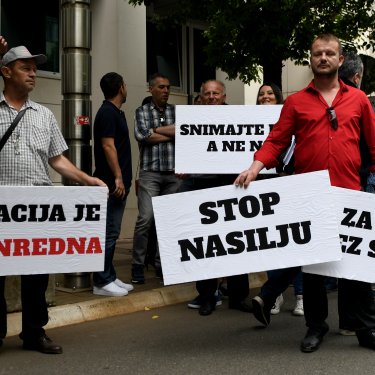RSF decries threats to investigative journalism in Montenegro

Reporters Without Borders (RSF) condemns the recent violence against Montenegro’s
investigative journalists, including this week’s shooting attack on Olivera Lakić, who was
already the target of a similar attack six years ago.
Lakić was hospitalized with injuries to the leg that were not life-threatening after being shot outside her home in the capital, Podgorica, on the evening of 8 May by an unidentified gunman who got away.
An experienced reporter for the magazine Vijesti, Lakić was the target of a similar attack in 2012, shortly after starting to covering tobacco trafficking in Montenegro, including the alleged involvement of two tobacco firms owned by a businessman with government ties, the Tara cigarette factory and the Montenegrin Tobacco Company.
She received police protection for a while after the first attack but finally decided to dispense with it because it was hampering her work.
Montenegro’s journalists were particularly shocked by this week’s shooting as it was the second attack on a reporter in just over a month. On 3 April, a bomb was detonated near the home of Sead Sadiković, a journalist who specializes in covering organized crime and corruption.
In response to calls from their unions, hundreds of journalists demonstrated outside the parliament building in Podgorica yesterday in protest against the latest attack on Lakić and the “culture of impunity.” They said neither of the attacks on Lakić had been condemned by the authorities and none of her revelations about organized crime had prompted police investigations.
“Government officials must publicly and systematically condemn all attacks on journalists and must take measures to find and punish the instigators of these crimes,” said Pauline Adès-Mével, the head of RSF’s EU-Balkans desk.
“This attack targeted the entire media profession and in particular, yet again, those journalists who cover trafficking and criminal networks. The Montenegrin authorities must provide them with the necessary protection and must end the verbal excesses that are creating a poisonous environment.”
New elected president Milo Djukanovic did condemn this week’s attack on Lakić but journalists accused him of hypocrisy inasmuch as he had again referred to them as “fascists” just a few days ago.
The impact of the attack on Lakić has been magnified by the fact that it comes on the heels of the murders to two other journalists in Europe who had been investigating crime rings and government associates.
Daphne Caruana Galizia, who was killed in Malta on 16 October 2017 by a bomb left under her car, had been covering political corruption. Ján Kuciak, who was murdered in Slovakia on 21 February 2018, specialized in investigating large-scale tax fraud. Kuciak’s last article focused on a Slovak businessman whose activities were controversial because of his links with several politicians. In Italy, police recently thwarted a plot to murder Paolo Borrometi, a journalist who specializes in covering the mafia.
Montenegro is ranked 103rd out of 180 countries in RSF's 2018 World Press Freedom Index.



